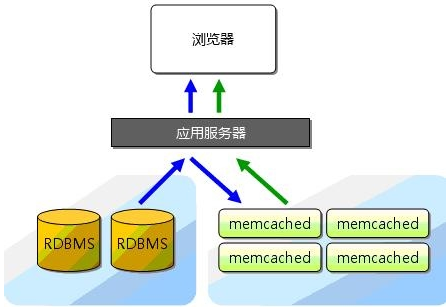1. memcache简介
memcache是danga.com的一个项目,它是一款开源的高性能的分布式内存对象缓存系统,,最早是给LiveJournal提供服务的,后来逐渐被越来越多的大型网站所采用,用于在应用中减少对数据库的访问,提高应用的访问速度,并降低数据库的负载。

为了在内存中提供数据的高速查找能力,memcache使用key-value形式存储和访问数据,在内存中维护一张巨大的HashTable,使得对数据查询的时间复杂度降低到O(1),保证了对数据的高性能访问,内存的空间总是有限的,当内存没有更多的空间来存储新的数据时,memcache就会使用LRU(Least Recently Used)算法,将最近不常用的数据淘汰掉,以腾出空间来存放新的数据。memcache存储支持的数据个事业是灵活多样的,通过对象的序列化机制,可以将更高层抽象的对象转换为二进制数据,存储在缓存服务器中,当前端应用需要时,又可以通过二进制内容反序列化,将数据还原成原有对象。
2. memcache安装
由于memcache使用了libevent来进行高效的网络链接处理,因此在安装memcache之前,需要安装libevent
下载libevent,这里采用的是1.4.14版本的libevent
wget https://github.com/downloads/libevent/libevent/libevent-1.4.14b-stable.tar.gz 解压: tar -xf llibevent-1.4.14b-stable.tar.gz 配置、编译、安装libevent: ./configure make sudo make install
下载memcache,并解压
wget http://www/memcache.org/files/memcache-1.4.17.tar.gz tar -xzvf memcache-1.4.17.tar.gz 配置、编译、安装memcache: ./configure make sudo make install
3. memcache启动和关闭
(1)启动memcache服务
/use/local/bin/memcache -d -m 10 -u root -l 192.168.1.10 -p 11211 -c 32 -p /tem/memcached.pid
@ -d:表示启动一个守护进程
@ -m:指定分配给memcache的内存数量,单位为MB,这里指定的是10MB
@ -u:用户名
@ -l:ip
@ -p:port
@ -c:最大运行的并发连接数
@ -P:指定memcache的pid文件保存的位置
(2)关闭memcache服务
kill `cat /tmp/memcached.pid`
4. memcache支持读取/写入数据方式
(1)set将数据保存到缓存服务器,如果缓冲服务器存在同样的key,则替换之
(2)add将数据保存到缓存服务器,如果缓冲服务器存在同样的key,则新增失败
(3)replace将数据替换缓冲服务器中的相同的key,如果缓冲服务器中不存在同样的key,则替换失败
(4)append将数据追加到已经存在的数据后面
(5)prepend将数据追加到已经存在的数据的前面
(6)cats提供对变量的cas操作,它将保证在进行数据更新之前,数据没有被其它人更改
(7)get从缓存服务器获取数据
(8)iner对计数器进行增量操作
(9)decr对计数器进行减量操作
(10)delete将缓存服务器上的数据删除
5. memcache C/C++客户端库libmemcached
(1)下载libmemcached,下载地址:https://launchpad.net/libmemcached/+download
(2)我下载的是libmemcached-1.0.17.tar.gz
(3)解压、配置、安装
cd /usr/local tar -vzxf libmemcached-1.0.17.tar.gz ./confiure make sudo make install
安装目录 /usr/local/include /usr/local/lib
6. libmemcached API

/* vim:expandtab:shiftwidth=2:tabstop=2:smarttab: * * Libmemcached library * * Copyright (C) 2011 Data Differential, http://datadifferential.com/ * Copyright (C) 2006-2009 Brian Aker All rights reserved. * * Redistribution and use in source and binary forms, with or without * modification, are permitted provided that the following conditions are * met: * * * Redistributions of source code must retain the above copyright * notice, this list of conditions and the following disclaimer. * * * Redistributions in binary form must reproduce the above * copyright notice, this list of conditions and the following disclaimer * in the documentation and/or other materials provided with the * distribution. * * * The names of its contributors may not be used to endorse or * promote products derived from this software without specific prior * written permission. * * THIS SOFTWARE IS PROVIDED BY THE COPYRIGHT HOLDERS AND CONTRIBUTORS * "AS IS" AND ANY EXPRESS OR IMPLIED WARRANTIES, INCLUDING, BUT NOT * LIMITED TO, THE IMPLIED WARRANTIES OF MERCHANTABILITY AND FITNESS FOR * A PARTICULAR PURPOSE ARE DISCLAIMED. IN NO EVENT SHALL THE COPYRIGHT * OWNER OR CONTRIBUTORS BE LIABLE FOR ANY DIRECT, INDIRECT, INCIDENTAL, * SPECIAL, EXEMPLARY, OR CONSEQUENTIAL DAMAGES (INCLUDING, BUT NOT * LIMITED TO, PROCUREMENT OF SUBSTITUTE GOODS OR SERVICES; LOSS OF USE, * DATA, OR PROFITS; OR BUSINESS INTERRUPTION) HOWEVER CAUSED AND ON ANY * THEORY OF LIABILITY, WHETHER IN CONTRACT, STRICT LIABILITY, OR TORT * (INCLUDING NEGLIGENCE OR OTHERWISE) ARISING IN ANY WAY OUT OF THE USE * OF THIS SOFTWARE, EVEN IF ADVISED OF THE POSSIBILITY OF SUCH DAMAGE. * */ #pragma once /* This seems to be required for older compilers @note http://stackoverflow.com/questions/8132399/how-to-printf-uint64-t */ #ifndef __STDC_FORMAT_MACROS # define __STDC_FORMAT_MACROS #endif #ifdef __cplusplus # include <tr1/cinttypes> # include <cstddef> # include <cstdlib> #else # include <inttypes.h> # include <stddef.h> # include <stdlib.h> # include <stdbool.h> #endif #include <sys/types.h> #include <libmemcached-1.0/visibility.h> #include <libmemcached-1.0/configure.h> #include <libmemcached-1.0/platform.h> #include <libmemcached-1.0/limits.h> #include <libmemcached-1.0/defaults.h> #include <libmemcached-1.0/types/behavior.h> #include <libmemcached-1.0/types/callback.h> #include <libmemcached-1.0/types/connection.h> #include <libmemcached-1.0/types/hash.h> #include <libmemcached-1.0/types/return.h> #include <libmemcached-1.0/types/server_distribution.h> #include <libmemcached-1.0/return.h> #include <libmemcached-1.0/types.h> #include <libmemcached-1.0/callbacks.h> #include <libmemcached-1.0/alloc.h> #include <libmemcached-1.0/triggers.h> #include <libhashkit-1.0/hashkit.h> #include <libmemcached-1.0/struct/callback.h> #include <libmemcached-1.0/struct/string.h> #include <libmemcached-1.0/struct/result.h> #include <libmemcached-1.0/struct/allocator.h> #include <libmemcached-1.0/struct/sasl.h> #include <libmemcached-1.0/struct/memcached.h> #include <libmemcached-1.0/struct/server.h> #include <libmemcached-1.0/struct/stat.h> #include <libmemcached-1.0/basic_string.h> #include <libmemcached-1.0/error.h> #include <libmemcached-1.0/stats.h> // Everything above this line must be in the order specified. #include <libmemcached-1.0/allocators.h> #include <libmemcached-1.0/analyze.h> #include <libmemcached-1.0/auto.h> #include <libmemcached-1.0/behavior.h> #include <libmemcached-1.0/callback.h> #include <libmemcached-1.0/delete.h> #include <libmemcached-1.0/dump.h> #include <libmemcached-1.0/encoding_key.h> #include <libmemcached-1.0/exist.h> #include <libmemcached-1.0/fetch.h> #include <libmemcached-1.0/flush.h> #include <libmemcached-1.0/flush_buffers.h> #include <libmemcached-1.0/get.h> #include <libmemcached-1.0/hash.h> #include <libmemcached-1.0/options.h> #include <libmemcached-1.0/parse.h> #include <libmemcached-1.0/quit.h> #include <libmemcached-1.0/result.h> #include <libmemcached-1.0/server.h> #include <libmemcached-1.0/server_list.h> #include <libmemcached-1.0/storage.h> #include <libmemcached-1.0/strerror.h> #include <libmemcached-1.0/touch.h> #include <libmemcached-1.0/verbosity.h> #include <libmemcached-1.0/version.h> #include <libmemcached-1.0/sasl.h> #include <libmemcached-1.0/deprecated_types.h> #ifdef __cplusplus extern "C" { #endif LIBMEMCACHED_API void memcached_servers_reset(memcached_st *ptr); LIBMEMCACHED_API memcached_st *memcached_create(memcached_st *ptr); LIBMEMCACHED_API memcached_st *memcached(const char *string, size_t string_length); LIBMEMCACHED_API void memcached_free(memcached_st *ptr); LIBMEMCACHED_API memcached_return_t memcached_reset(memcached_st *ptr); LIBMEMCACHED_API void memcached_reset_last_disconnected_server(memcached_st *ptr); LIBMEMCACHED_API memcached_st *memcached_clone(memcached_st *clone, const memcached_st *ptr); LIBMEMCACHED_API void *memcached_get_user_data(const memcached_st *ptr); LIBMEMCACHED_API void *memcached_set_user_data(memcached_st *ptr, void *data); LIBMEMCACHED_API memcached_return_t memcached_push(memcached_st *destination, const memcached_st *source); LIBMEMCACHED_API memcached_server_instance_st memcached_server_instance_by_position(const memcached_st *ptr, uint32_t server_key); LIBMEMCACHED_API uint32_t memcached_server_count(const memcached_st *); LIBMEMCACHED_API uint64_t memcached_query_id(const memcached_st *); #ifdef __cplusplus } // extern "C" #endif
#include "stdio.h" #include <string> #include <iostream> using namespace std; #include <libmemcached/memcached.h> int main() { memcached_st *memc; memcached_return rc; memcached_server_st *server; time_t expiration = 0; uint32_t flags = 0; memc = memcached_create(NULL); server = memcached_server_list_append(NULL, "127.0.0.1", 11211, &rc); rc = memcached_server_push(memc, server); memcached_server_list_free(server); string key = "key"; string value = "value"; size_t value_length = value.length(); size_t key_length = key.length(); //Save data rc = memcached_set(memc, key.c_str(), key.length(), value.c_str(), value.length(), expiration, flags); cout << rc << endl; if (rc == MEMCACHED_SUCCESS) { cout << "Save data:" << value << " sucessful!" << endl; } //Get data char* result = memcached_get(memc, key.c_str(), key_length, &value_length, &flags, &rc); if (rc == MEMCACHED_SUCCESS) { cout << "Get value:" << result << " sucessful!" << endl; } //Delete data rc = memcached_delete(memc, key.c_str(), key_length, expiration); if (rc == MEMCACHED_SUCCESS) { cout << "Delete key:" << key << " sucessful!" << endl; } //free memcached_free(memc); return 0; }

